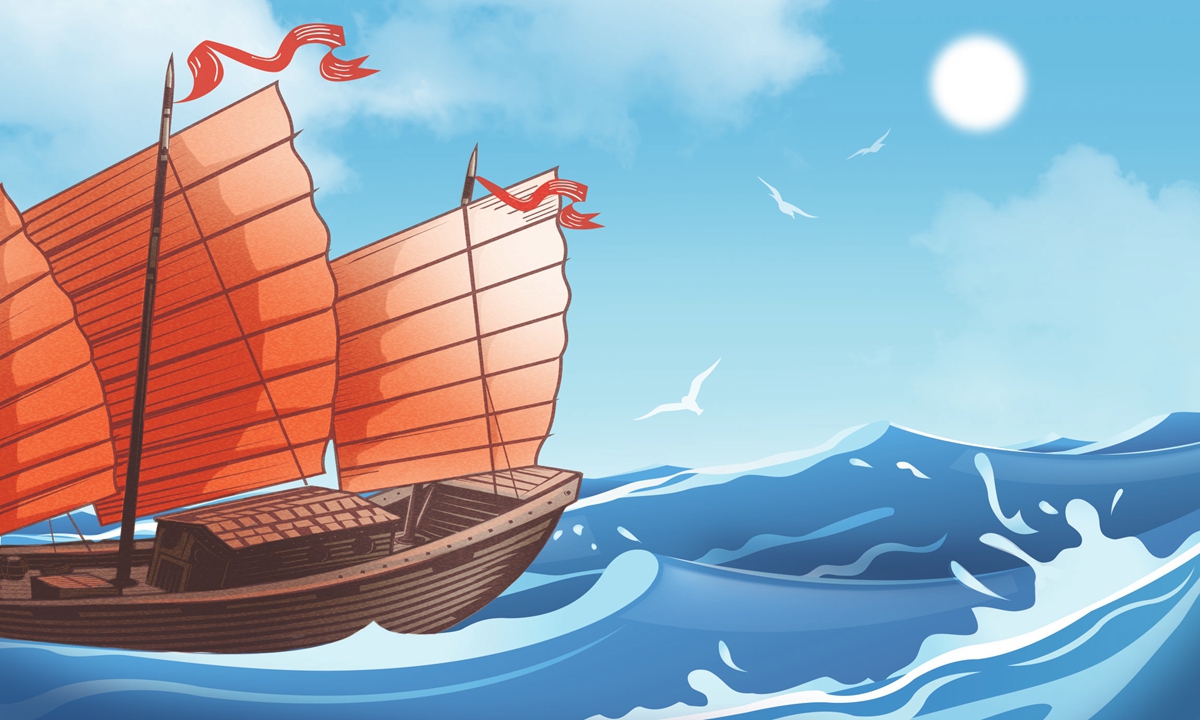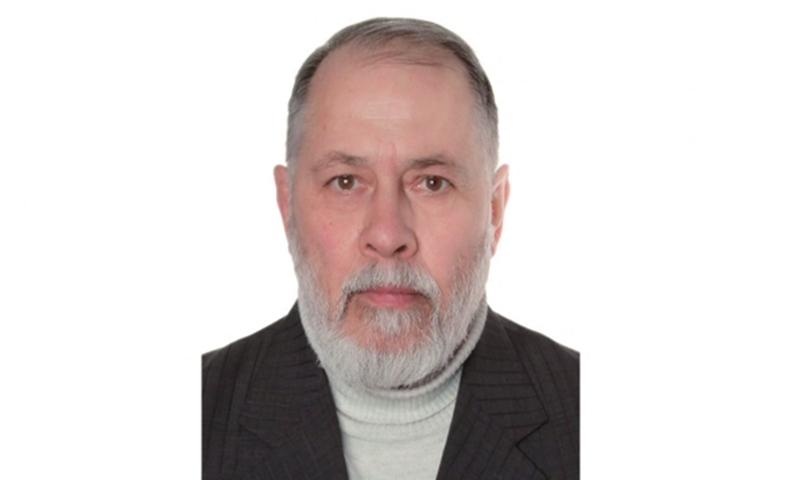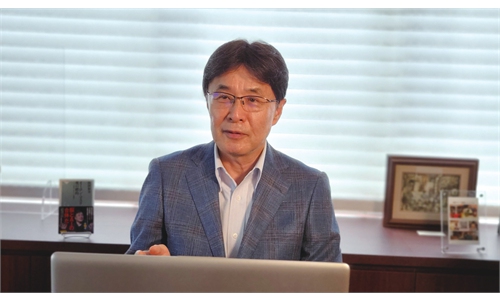CPC learns from Soviet Union's mistakes, helps build a community of shared future for mankind in Eurasia: Russian scholar

Illustration: Liu Rui/Global Times
Editor's Note:
The year 2021 is special to both the Chinese and Russian people. Exactly 100 years ago, the Communist Party of China (CPC) was established. Today, the CPC still leads China and keeps on growing with great vigor. Thirty years ago, the Soviet Union disintegrated under the leadership of a communist party. What has decided the completely different fates of the two communist parties? What has driven the CPC to go stronger and stronger after 100 years? Why does the West always misunderstand the CPC? Political scientist Vladimir Pavlenko (Pavlenko), who is also a columnist for Russian news agency REGNUM and research fellow at the Moscow-based independent public scientific organization Academy of Geopolitical Problems, discussed these issues with Global Times (GT) reporter Xia Wenxin.
GT: The Western narrative about the CPC in recent years has always avoided CPC's positive effects on China's social progress and world economic development. Why can't the West view the CPC objectively?
Pavlenko: Social progress in China, as well as China's influence on world development, is bothering Washington.
First, and most importantly,the US population is less than 5 percent of the world total. But Americans consume too much of the world's resources, including almost 17 percent of the world's energy. The US elite understand very well that the progress of the non-Western world - primarily China and India, countries with the largest population in the world - will push Western civilization to decide to either "shrink" and reduce its own consumption, or embark on a policy of containing these countries (especially China) and pitting them against each other. The US wages a "hybrid" war against China in areas such as economics and information to encounter China's competition with it.
Second, if we talk about resources, retired US vice admiral Arthur Cebrowski has openly stated that participation in the globalization of non-Western countries requires them to recognize Western values and transfer their natural resources under the control of Western monopolies. Today, the West "bashfully" pursues a neocolonial policy toward the non-Western world, focusing on ideas of democracy and human rights.
This can be proven by the ultimatums that the US delegation of negotiators gave Beijing in May 2018 before Donald Trump imposed tariffs on Chinese goods. The US delegation had two main demands: One, China should cut its trade surplus with the US by $100 billion. And two, the Chinese government should stop supporting its high-tech industries. The US also required China to open up its services and agricultural sectors to full American competition. In other words, Washington demanded that the advanced part of Chinese industrial technology and means of production be transferred into the hands of the US. This is an example of modern neocolonialism.
Third, the international projects that China implements, primarily the Belt and Road Initiative (BRI), are seen by the West as a threat to its influence in developing countries. Washington, together with Paris and London, have always considered Africa as their patrimonial estate. This was especially true after the disintegration of the Soviet Union. Today, their position has been shaken, and it is no accident that one of the first things Joe Biden did as soon as he came to power was to proclaim a new project against the China-proposed BRI. The West is very much afraid that step by step it will lose its global influence, and then it will return to stay within the limits of its geographical habitat - Western and Central Europe as well as North America. This would be a civilizational catastrophe that the West cannot survive in its present form. Therefore, for the West, to recognize China's contribution to world development is like meeting its doom.
In the eyes of the West, China, under the leadership of the CPC, challenges it, so the CPC is the adversary of the West. This is also what is believed in Washington. In addition, the US is the largest bourgeois state, and for it, Marxism that guides the CPC is a threat to the capital's world domination. Therefore, it is not expected that Washington would speak objectively about the CPC.
GT: China's reform and opening-up is about being open to Western societies and systems to learn from their strengths. This policy has brought a huge boost to China's development. Do you think Western societies can one day open up their minds to take a serious look at the Chinese political system?
Pavlenko: In my opinion, the West takes the potential of China's political system very seriously, since it sees China as its opponent. Just like the Soviet Union back in its days, China today offers the world a new type of international relations, built not on force, but on justice. The core of Chinese socialism is welfare for all, not for the select few. In Washington, for example, they are very serious about China's poverty alleviation. They are not happy about this achievement, but, what's more, they view it in terms of the scale of China's potential, social consolidation, and its ability to withstand confrontation with the US. Americans find such achievements in China to be frightening.
The West overall and the US in particular are very well aware that China's combination of a market economy with strategic planning provides the country with objective advantages and increases economic efficiency. Socialism is stronger than capitalism precisely because of the broad support of the masses. The masses hold their own power, not someone else.
And if it's impossible to use the Chinese model with proven efficiency, then this model must be discredited, or better to be destroyed. The West has no other way out, and this circumstance explains how fiercely the US fights against China and denies the Chinese political system. If the Chinese system is adopted, the power of the oligarchs will end. Therefore, the oligarchs in the West will do everything to preserve their system that has ensured their world domination for many years.
The policy of reform and opening-up helped China to make a real breakthrough. Just as socialism with Chinese characteristics has become a tool to combine advanced ideology with national tradition, the course of reform and opening-up is also being conducted with the support of Chinese traditions. The Western experience was certainly borrowed from others, but only in terms of technology, organization, trade, and so on. And China's value system remains to be its own kind: It combines socialism with national traditions.

Vladimir Pavlenko
GT: It is not easy for many developing countries to achieve sustainable economic development and sustainable social stability at the same time. But China has succeeded under the leadership of the CPC. What distinguishes the CPC from political parties in other developing countries?Pavlenko: The most important component of China's success is the systemic suppression of systemic corruption that has dramatically grown. It in some cases simply restored the credibility of the CPC in the broad masses of the people. But beyond this, there are other factors. First of all, the CPC has defended Chinese sovereignty and the right to pursue sovereign economic policies in the context of a close China-US trade interrelation and China's integration into global economic institutions and processes. Most developing countries today are weak to assert their sovereignty and make smart use of the fruits of sovereignty.
Second, it is worth mentioning that China's policy of reform and opening-up was launched by the very first revolutionary generation. For them, the ideals of revolution were their life's cause. If we draw parallels with the reforms in the Soviet Union, I assure you that if they had been led by Stalin, not by Kosygin, success would have been guaranteed. The old revolutionaries had a different level of authority, and the public trust in them was much higher. And they are allowed much more than the new leaders. It was not by chance that, for example, a communist with the "pre-revolutionary [Note: the October Revolution in 1917] experience" in the Communist Party of the Soviet Union (Bolsheviks) could not become leaders, but any younger leader was bound to listen to his opinion.
Third, the centralized system, built on strong party leadership, provided purposefulness and consistency of reforms. There are goals and tasks; there is demand and responsibility for their implementation. In this sense, the socialist economy is China's giant advantage over other countries because it is much better adapted to solve advanced problems than the capitalist economy.
Fourth, you have the necessary flexibility of governance. In Xi's report at the 19th National Congress of the CPC, I was struck by one very simple idea: "We must see that the market plays the decisive role in resource allocation." That is the essence of economic policy. The planning is the strategy, whereas the market is the tactic, and its function is primarily to quickly and efficiently redistribute resources to breakthrough areas.
China has proven that the planning and the market are inseparable, and it's just that each of the two has its own level of responsibility and own tasks. Here also lies the answer to the question about how the CPC differs from other parties in developing countries. It is only possible to delegate some of the administrative functions to the local levels if there is a united center that can quickly notice and correct local mistakes and excesses. Without a reliable center, local autonomy can degenerate into regionalism and separatism, and thus tear the country apart. China has such a center, and it is the CPC.
GT: The US has been unilaterally promoting "universal values" and strongly enforcing a Western political system on other countries. China, on the other hand, advocates the idea of a "community of shared future for mankind." It opposes the substitution of one civilization for another. Do you think China's proposal deserve more attention?
Pavlenko: The "universal" values, in fact, are not even the values of the Western civilization, which was originally Christian civilization. They are a product of perversion of Christian values that were transformed to Protestantism and then to Freemasonry. In the process of this transformation, ideals are replaced by interests, and here the well-known practice of "double standards" is introduced. It turns out that the so-called universal values do not reflect the interests of Western ordinary peoples. Instead, it reflects the interests of Western elites that are based on these distorted, sometimes occult, things. To introduce these values, the principle of gradualism is used. They make sure that reality does not change abruptly or immediately. This makes sure that people do not rise up in rebellion. Instead, they change the reality step by step and little by little, so that people can get used to and adapt to small changes that could result in big ones if summed up.
What China proposes is a community of shared future for mankind, a community on the scale of the whole planet. And this project will never gain the support of the West. The West will never accept the equality of civilizations, since such equality finishes the West's leadership, or rather, domination. The desire for domination is the point of the Anglo-Saxon tradition that drives Western history and politics. The current closer relations between Russia and China of historic significance are the first step toward establishing an alternative on the global level to the Western system of "values," and, in fact, interests.
The Soviet Union was so hated by the West because it offered an alternative to the West in the world - it introduced a new, alternative view of the world, as well as the world's past, present, and future. The only way to press the West off from its position is to unite forces in such an alternative. It's one thing to go to the building superintendent and ask him for a bigger, better apartment. Even if he gives it to you, he will set the conditions in his favor. It's quite another thing when you leave the superintendent and start building your own house next to his. In this case, building the community of shared future for mankind is just like building your own house, and that is our common goal.
GT: The BRI is one of the practices of the idea of "a community of shared future for mankind." What are the similarities between the BRI and the Russia proposed Greater Eurasian Partnership? Is it possible that the two strategic visions will coordinate with each other and contribute to the formation of a community of shared future for mankind?
Pavlenko: Halford Mackinder, a British political geographer, at the beginning of the 20th century divided the world into maritime and land countries. He called our continent Greater Eurasia the "World-Island" or "Heartland." And he concluded that whoever rules the World-Island commands the world. Since then, the expansion into Heartland, at least two-thirds of which is the territory of Russia and China, has become the core of Western geopolitics.
The next touch to this Western view of the world was made by Nicholas J. Spykman, who specified that between the center of Heartland and its outskirts lies a belt of "limitrophe" states - the border spaces that are the fronts of the struggle between the land and sea powers. He called this belt "Rimland."
Then Zbigniew Brzezinski, Polish-American diplomat and political scientist, in his book The Grand Chessboard: American Primacy and Its Geostrategic Imperatives suggested that US geopolitics focus on preventing the creation and rise of forces in Eurasia that are capable of challenging US dominance, be it a single country or an alliance of several countries.
When Russian and Chinese leaders Vladimir Putin and Xi Jinping agreed to pair the Eurasian Economic Union (EAEU) and the BRI, it immediately became clear that our countries are thus forming a project alternative to the West. And the main goal of this project (it is not necessary to talk about it aloud, but it is important to understand it) is to unlock the "Anaconda ring" - a strategy said to be used by the West to encircle Russia with hostile states.
Under this plan, the West has already surrounded the Eurasian Heartland with the help of limitrophe states in the Rimland. The meaning of the Greater Eurasia project, including the EAEU and the BRI, is to build a Eurasia for Eurasians and in the interests of Eurasians. Our great continent cannot and should not become a colony and a source of resources for the so-called golden billion. The term "golden billion" in the Russian language refers to wealthy people in the West. And as our two countries and peoples get closer and closer, every step along this path will convince both us and the peoples of Eurasia more that a community of Eurasian peoples with a shared future can become a reality.


